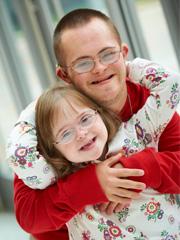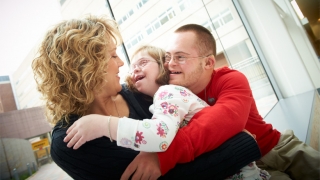When John and Sara Rosati come to The Children’s Hospital of Philadelphia for their regular appointments, just about everyone they see knows their names.
That's because John and Sara have been coming to CHOP since a few hours after they were born. Diagnosed with trisomy 21, John and Sara were both transferred to CHOP as very sick newborns.
 It’s no surprise that they are like family at the Hospital — or “royalty,” according to their mom, Stephanie Rosati-Pratico. With two biological children with Down syndrome, the Rosati family has been visiting CHOP several times a month for more than 18 years.
It’s no surprise that they are like family at the Hospital — or “royalty,” according to their mom, Stephanie Rosati-Pratico. With two biological children with Down syndrome, the Rosati family has been visiting CHOP several times a month for more than 18 years.
Continuity of care
John is now a 19-year-old young man, and CHOP remains a key component of his life because the Trisomy 21 Program also sees adult patients.
“It’s a huge relief to know John will have continuity of care and can stay a patient of the Trisomy 21 Clinic,” Rosati-Pratico says. “One of the biggest fears of a CHOP parent — especially if your child has developmental disabilities — is transitioning to adult providers. This program helps with that.”
John will shift from seeing Mary Pipan, MD, clinical director of the Trisomy 21 Program, to seeing David Lynch, MD, PhD, program director, who sees adult trisomy 21 patients. Nurse practitioner Kim Schadt, MSN, CRNP, CCRP, social worker Symme Trachtenberg, MSW, and physical therapist Helen Milligan, MPT, will also continue to see John in the adult Trisomy-21 Clinic.
As the Adult Trisomy 21 Program grows, the team continues to focus on developing a list of specialists in adult medicine who work well with Down syndrome patients. In an effort to ensure a smooth transition, the program shares medical records and special insights into the patient with the new adult providers.
“John sees specialists in GI, ENT, pulmonary and allergy, but I’m not overly concerned with finding adult providers because I know I have the support from CHOP I need,” Rosati-Pratico says.
Support, care and respect
That feeling of support has always been there for the family. When Sara outgrew her stroller, Dr. Pipan made arrangements and provided all necessary support documentation for her to get a medical stroller. When John was diagnosed with a gait issue, the Trisomy 21 Program arranged for consultations with orthopedics and physical therapy.
 Sara, now 13, still sees numerous CHOP specialists, but it is Dr. Pipan — and her long-time relationship with Sara and her family — that is at the center of Sara’s care.
Sara, now 13, still sees numerous CHOP specialists, but it is Dr. Pipan — and her long-time relationship with Sara and her family — that is at the center of Sara’s care.
“Dr. Pipan and I have had many discussions about what would benefit Sara the most, and also what the reality is of our lives,” says Rosati-Pratico. “There’s a lot of give and take, and we come up with a plan that works. Dr. Pipan is a great listener, she really ‘gets’ what you’re saying.”
Even though John and Sara face developmental challenges, physicians at CHOP are respectful and include them in discussions.
“They talk directly to the kids and address questions to them,” Rosati-Pratico says. “That’s family-centered care, and it’s encouraged and supported everywhere throughout CHOP.”
Looking to tomorrow
Over the past 18 years, John and Sara have had too many surgeries, hospitalizations, Emergency Department visits, therapy sessions and specialist appointments to count.
They have gone beyond surviving — not a sure thing in their earliest days — to thriving, with the help of the Trisomy 21 Program and other divisions at CHOP.
“I am forever grateful that I was blessed with John and Sara. Through my experiences, I have developed a true sense of gratitude and respect for CHOP,” Rosati-Pratico says. “If it was not for CHOP, I would not have my children today. So I was blessed yet again, in that I live close enough to CHOP that my children can receive all their care here.”
Originally posted: June 2009
Updated: November 2012